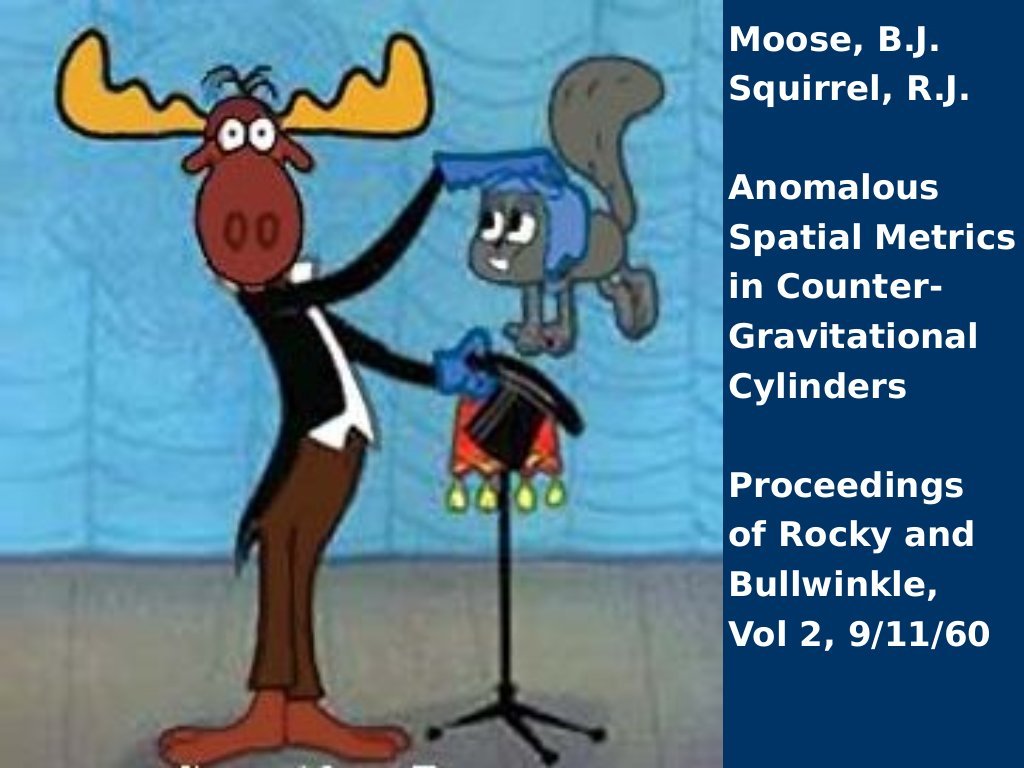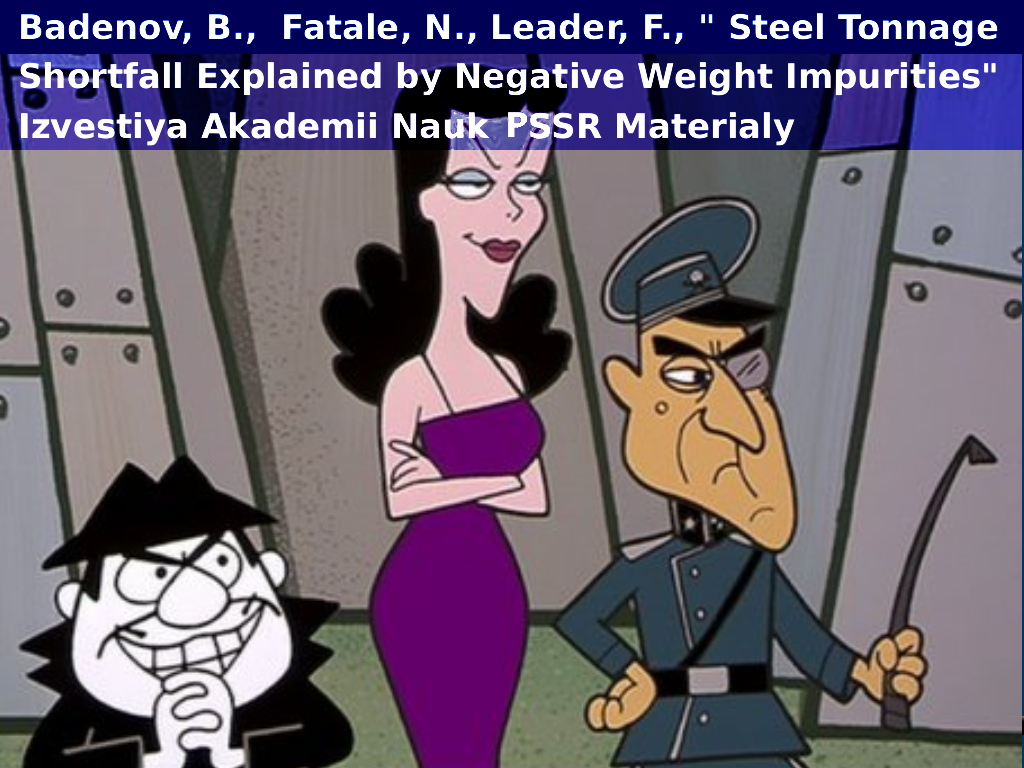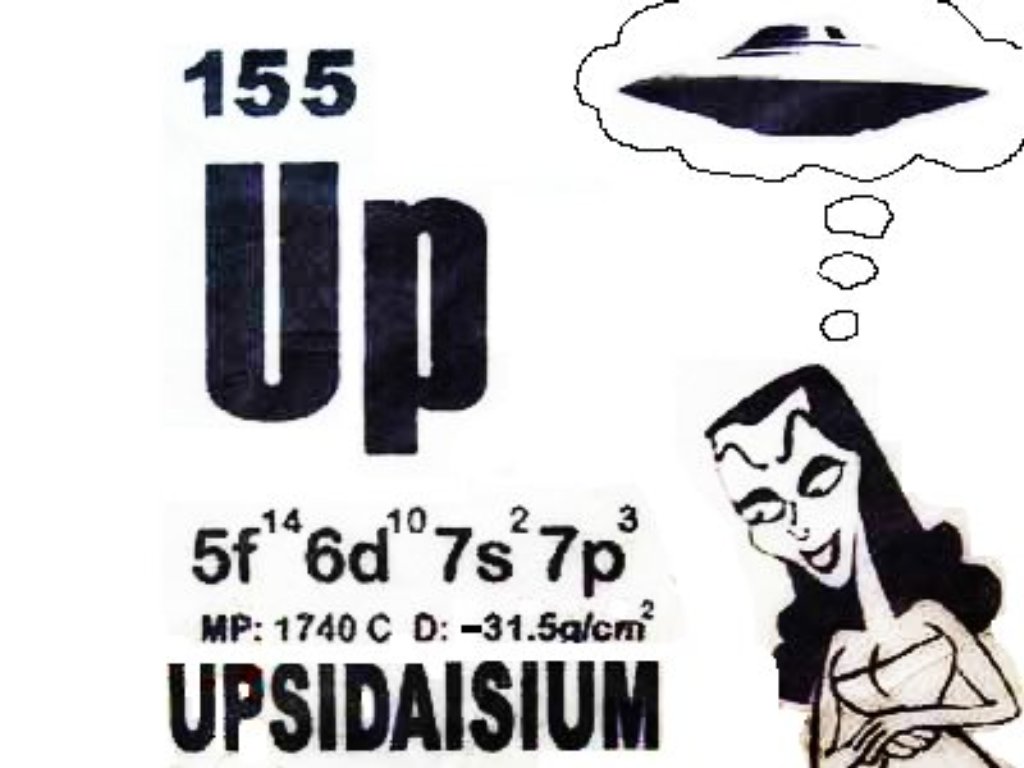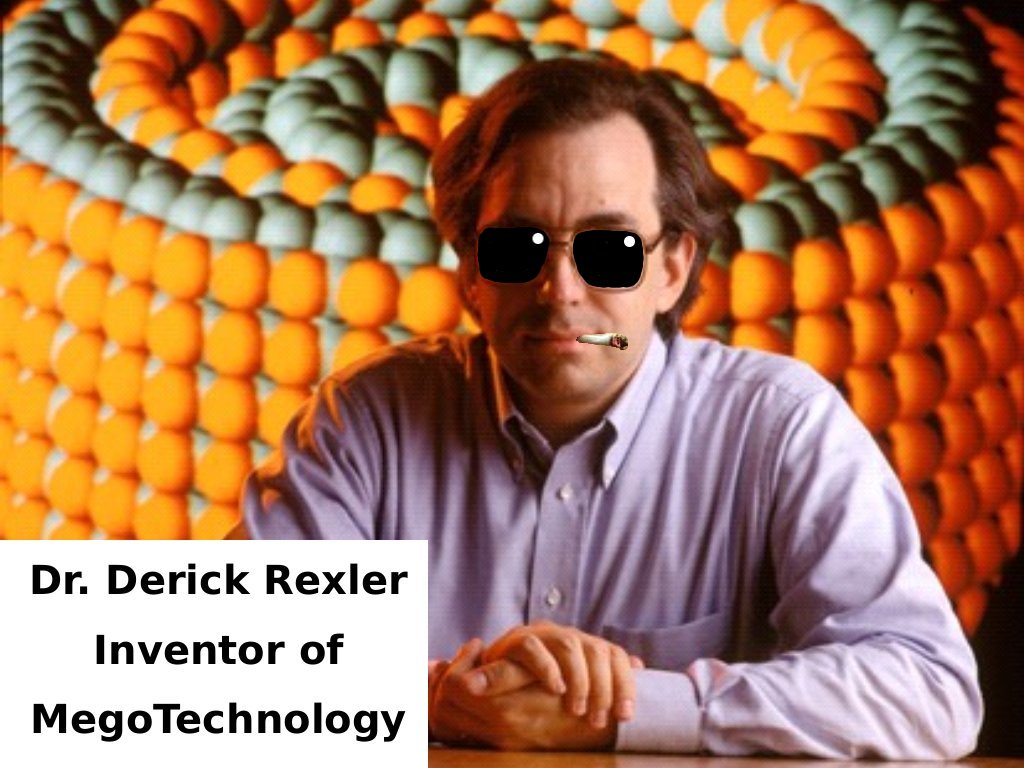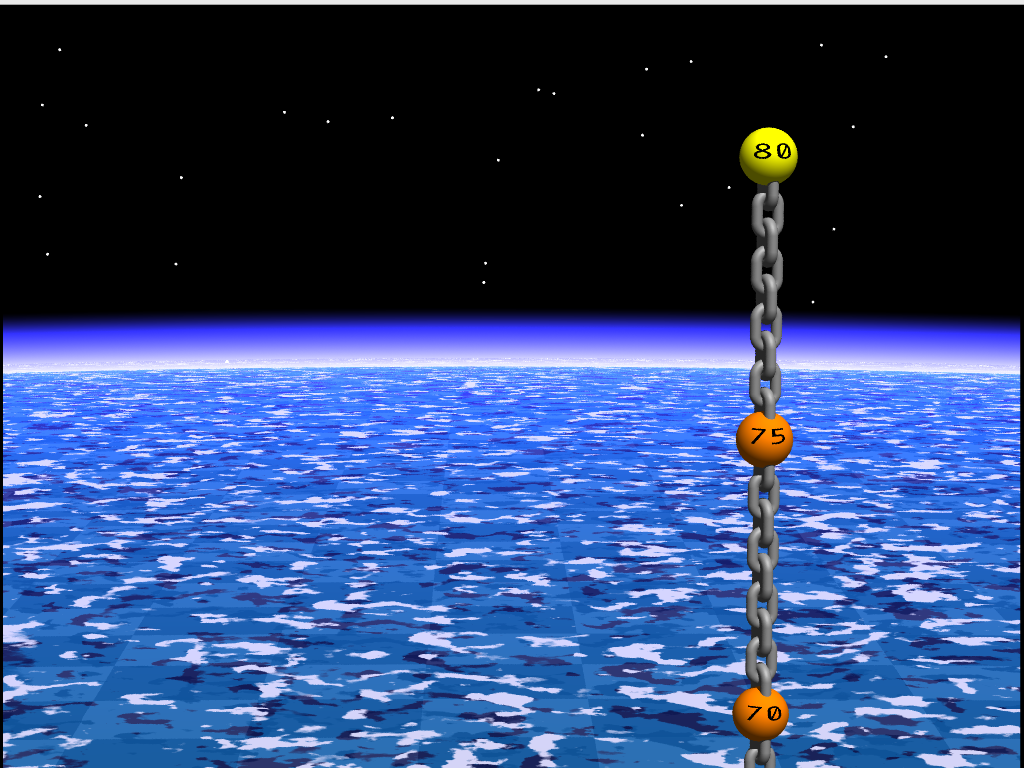|
Size: 6283
Comment:
|
Size: 6397
Comment:
|
| Deletions are marked like this. | Additions are marked like this. |
| Line 4: | Line 4: |
| || The Preposterosity Institute measures the preposterosity of ideas. <<BR>> We have determined that the preposterosity of the space elevator and the launch loop are far less than 500 milliHubbards. Now you can confidently correct those who disparage it. <<BR>> As an example of true preposterosity, I will present the Upsidaisium Space Anchor, an idea with a measured preposterosity of 985 milliHubbards. || {{attachment:title.png | title | width=768 }} || | || The Preposterosity Institute measures the preposterosity of ideas. <<BR>><<BR>> We have determined that the preposterosities of the space elevator and the launch loop are far less than 500 milliHubbards. Now you can confidently correct the ignorant fools who claim these ideas are preposterous. <<BR>> <<BR>> As an example of true preposterosity, I will present the Upsidaisium Space Anchor, an idea with a measured preposterosity of 985 milliHubbards. || {{attachment:title.png | title | width=768 }} || |
| Line 6: | Line 6: |
| || Russian youth read about art, athletics and science from the Komsumolskaya Pravda. American children ate Sugar Pops and watched television cartoons, such as the Rocky and Bullwinkle show, where we learned about time travel, lunatic inventions, and the cold war. || {{ attachment:tvshow.png | tv show | width=768 }} || | || Russian youth read about art, athletics and science in the magazine Komsumolskaya Pravda. <<BR>> <<BR>> American children ate Sugar Pops and watched television cartoons, such as the Rocky and Bullwinkle show, where we learned about time travel, lunatic inventions, and the cold war. || {{ attachment:tvshow.png | tv show | width=768 }} || |
| Line 8: | Line 8: |
| || A few months after Yuri Artsutanov described the Space Elevator in Komsumolskaya, Rocky and Bullwinkle discovered Upsidaisium. This is a magic material with negative weight. Upsidaisium can be used for antigravity applications, but primary use is explaining scientific results that do not match theoretical expectations. || {{ attachment:discover.png | discovery of upsidaisium | width=768 }} || | || A few months after Yuri Artsutanov described the Space Elevator in Komsumolskaya, Rocky and Bullwinkle discovered Upsidaisium. This is a magic material with negative weight. Upsidaisium can be used for antigravity applications, but its primary use is explaining scientific results that do not match theoretical expectations. || {{ attachment:discover.png | discovery of upsidaisium | width=768 }} || |
| Line 10: | Line 10: |
| || Meanwhile, the Pottsylvania Steel Works achieved only 27% of their 5 year plan quota. Doctors Boris Badenov, Natasha Fatale, and Fearless Leader of the Pottsylvania Metallurgical Institute published an explanation based on Upsidaisium. || {{ attachment:akademii.png | boris, natasha, and fearless leader | width=768 }} || | || Meanwhile, the Pottsylvania Steel Works achieved only 27% of their 5 year plan quota. Doctors Boris Badenov, Natasha Fatale, and Fearless Leader of the Pottsylvania Metallurgical Academy published an explanation based on Upsidaisium. || {{ attachment:akademii.png | boris, natasha, and fearless leader | width=768 }} || |
| Line 12: | Line 12: |
| || Although Doctors Badenov and Leader were executed for this paper, Doctor Fatale lived to isolate Upsidaisium and characterize it. It has an atomic number of 155, and a nucleus made of 233 up quarks and one down quark. This is extremely unstable, and the nucleus rapidly decays. However, all the quarks are emitted in precisely the same time, at the same speed, and in same direction - up. This inspired Doctor Fatale to construct the first Upsidaisium space vehicle. Unfortunately, she put all the Upsidaisium on the bottom. This was a mistake. At forty thousand feet, the vehicle turned upside down, and she fell out, joining her colleagues. || {{ attachment:chem.png | upsidaisium | width=768 }} || | || Although Doctors Badenov and Leader were executed for this paper, Doctor Fatale lived to isolate Upsidaisium and characterize it. It has an atomic number of 155, and a nucleus made of 233 up quarks and one down quark. This is extremely unstable, and the nucleus rapidly decays. However, all the quarks are emitted at precisely the same time, at the same speed, and in same direction - up. This inspired Doctor Fatale to construct the first Upsidaisium space vehicle. Unfortunately, she put all the Upsidaisium on the bottom. This was a mistake. At forty thousand feet, the vehicle turned upside down, and she fell out, joining her colleagues. || {{ attachment:chem.png | upsidaisium | width=768 }} || |
| Line 16: | Line 16: |
| || Nonetheless, Upsidaisium was manufactured in powerful congressional districts, so production proceeded unabated. It has been successfully used to help farmers produce not just zero but negative crop tonnages, doubling their farm subsidies. Other than that, it is being stored by the negative gigaton in these vast chain-anchored storage areas. || {{ attachment:vault.png | storage vault | width=768 }} || | || Nonetheless, Upsidaisium is manufactured in powerful congressional districts, so production continues unabated. It has been successfully used to help farmers produce not just zero but negative crop tonnages, doubling their farm subsidies. Other than that, it is being stored by the negative gigaton in these vast chain-anchored storage areas. || {{ attachment:vault.png | storage vault | width=768 }} || |
| Line 18: | Line 18: |
| || The Preposterosity Institute's Doctor Derick Rexler recently developed a new space application for Upsidaisium. Doctor Rexler is the visionary founder of the field of Megotechnology, the construction of large and useless objects from geographically imprecise spheres of metal. Behind him in this photo is a 30 foot diameter assembly of brass and lead spheres held together by putty, demonstrating how Megotechnology can produce materials that are both fragile and weak, yet very, very heavy. And no, we do not know what he is smoking. || {{ attachment:derick.png | derick | width=768 }} || | || The Preposterosity Institute's Doctor Derick Rexler recently developed a new space application for Upsidaisium. Doctor Rexler is the visionary founder of Megotechnology, the construction of large and useless objects from geographically imprecise spheres of metal. Behind him in this photo is a 30 foot diameter assembly of brass and lead spheres held together by putty, demonstrating how Megotechnology can produce materials that are both fragile and weak, yet very, very heavy. And no, we do not know what he is smoking. || {{ attachment:derick.png | derick | width=768 }} || |
| Line 20: | Line 20: |
| || Dr Rexler will use Megotechnology for the construction of the Space Anchor, a series of one mile diameter Upsidaisium spheres, connected to a concrete anchor on the sea floor by an enormous cast iron chain. The 80 mile high Space Anchor is impervious to wind, lightning, and terrorist attack, though it can rust. At the top, payloads are released into space, where they either learn how to fly, or plummet. Space junk in Low Earth Orbit simply crashes into the Space Anchor, and rains down the side. Eventually, so do all the useful satellites, providing a lucrative opportunity to launch more. The Space Anchor will allow the aerospace industry to double or even triple revenues. || {{ attachment:anchor.png | space anchor | width=768 }} || | || Dr Rexler will use Megotechnology for the construction of the Space Anchor, a series of one mile diameter Upsidaisium spheres, connected to a concrete slab on the sea floor by an enormous cast iron chain. The 80 mile high Space Anchor is impervious to wind, lightning, and terrorist attack, though it can rust. At the top, payloads are released into space, where they either learn how to fly, or plummet. Space junk in Low Earth Orbit simply crashes into the Space Anchor, and rains down the side. Eventually, so do all the useful satellites, providing a lucrative opportunity to launch more. The Space Anchor will allow the aerospace industry to double or even triple revenues. || {{ attachment:anchor.png | space anchor | width=768 }} || |
| Line 22: | Line 22: |
| || The Space Anchor needs a climber. Here's one of ours, reaching the top during our recent Space Anchor Games in New York City. We chose New York rather than Dryden because the restaurants are better. When we develop a space suit large enough for this big boy, we're going into space with him. || {{ attachment:climber.jpg | king kong | width=768 }} || | || The Space Anchor needs a climber to travel from earth to space. Here's one of ours, reaching the top during our recent Space Anchor Games in New York City. We chose New York rather than the Dryden Flight Research Center because the restaurants are better. When we develop a space suit large enough for this big boy, we're going into space with him. || {{ attachment:climber.jpg | king kong | width=768 }} || |
The Upsidaisium Space Anchor. (presented at the Space Elevator Conference, Sunday August 16 2009)
The Preposterosity Institute measures the preposterosity of ideas. |
|
Russian youth read about art, athletics and science in the magazine Komsumolskaya Pravda. |
|
A few months after Yuri Artsutanov described the Space Elevator in Komsumolskaya, Rocky and Bullwinkle discovered Upsidaisium. This is a magic material with negative weight. Upsidaisium can be used for antigravity applications, but its primary use is explaining scientific results that do not match theoretical expectations. |
|
Meanwhile, the Pottsylvania Steel Works achieved only 27% of their 5 year plan quota. Doctors Boris Badenov, Natasha Fatale, and Fearless Leader of the Pottsylvania Metallurgical Academy published an explanation based on Upsidaisium. |
|
Although Doctors Badenov and Leader were executed for this paper, Doctor Fatale lived to isolate Upsidaisium and characterize it. It has an atomic number of 155, and a nucleus made of 233 up quarks and one down quark. This is extremely unstable, and the nucleus rapidly decays. However, all the quarks are emitted at precisely the same time, at the same speed, and in same direction - up. This inspired Doctor Fatale to construct the first Upsidaisium space vehicle. Unfortunately, she put all the Upsidaisium on the bottom. This was a mistake. At forty thousand feet, the vehicle turned upside down, and she fell out, joining her colleagues. |
|
Meanwhile, Upsidaisium went into volume production in the United States. Pure upsidaisium undergoes thermo-chromeric decomposition (that is, it explodes), but diluting it with small quantities of Wisconsin cheese dampens this reaction. The United States attempted to use upsidaisium to lighten ICBM boosters, but found that after expending the fuel, the rocket bodies now had negative weight, missed their targets, and in fact drifted off into intergalactic space. Last ditch efforts by defense department program managers to emphasize the intergalactic threat were unsuccessful in congress. |
|
Nonetheless, Upsidaisium is manufactured in powerful congressional districts, so production continues unabated. It has been successfully used to help farmers produce not just zero but negative crop tonnages, doubling their farm subsidies. Other than that, it is being stored by the negative gigaton in these vast chain-anchored storage areas. |
|
The Preposterosity Institute's Doctor Derick Rexler recently developed a new space application for Upsidaisium. Doctor Rexler is the visionary founder of Megotechnology, the construction of large and useless objects from geographically imprecise spheres of metal. Behind him in this photo is a 30 foot diameter assembly of brass and lead spheres held together by putty, demonstrating how Megotechnology can produce materials that are both fragile and weak, yet very, very heavy. And no, we do not know what he is smoking. |
|
Dr Rexler will use Megotechnology for the construction of the Space Anchor, a series of one mile diameter Upsidaisium spheres, connected to a concrete slab on the sea floor by an enormous cast iron chain. The 80 mile high Space Anchor is impervious to wind, lightning, and terrorist attack, though it can rust. At the top, payloads are released into space, where they either learn how to fly, or plummet. Space junk in Low Earth Orbit simply crashes into the Space Anchor, and rains down the side. Eventually, so do all the useful satellites, providing a lucrative opportunity to launch more. The Space Anchor will allow the aerospace industry to double or even triple revenues. |
|
The Space Anchor needs a climber to travel from earth to space. Here's one of ours, reaching the top during our recent Space Anchor Games in New York City. We chose New York rather than the Dryden Flight Research Center because the restaurants are better. When we develop a space suit large enough for this big boy, we're going into space with him. |
|
Q and A:
Doesn't the climber need a lot of bananas for fuel? Actually, our climber suffered from core overheating, due to the high volume to surface area ratio. We fed the climber banana-flavored ice cream cones, and licked that problem. The biggest problem was climber effluent, which rains downwards to the streets. Another good reason to test in New York is that the effluent is indistinguishable from what is already there.
Can a space anchor be used on Mars? Perhaps. The space anchor is constructed with weak materials, and will break frequently. We are confident that some of the pieces will end up on Mars.
Do you use Unobtainium on the Space Anchor? No. Unobtainium is wonderful stuff, and refuses to have anything to do with the low class materials used in the Space Anchor.
How are you funding this? We fudged our paperwork to pretend we are a failing financial institution run by overpaid executives. We have been promised ten quadrillion dollars by the current administration. We will use the money for parties, and to construct one chain link. We expect cost overruns to pay for the rest.



